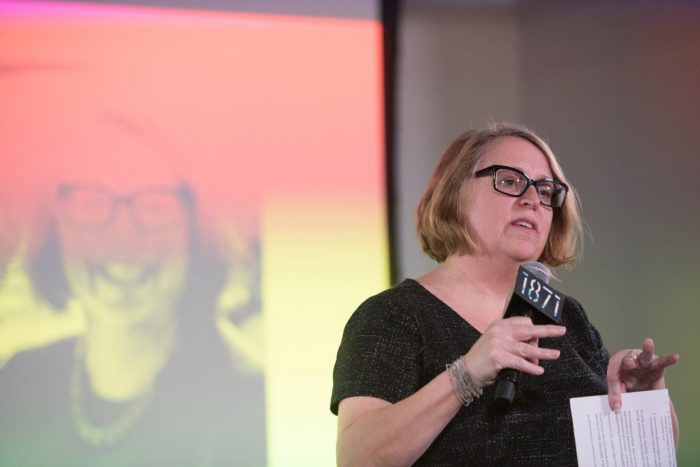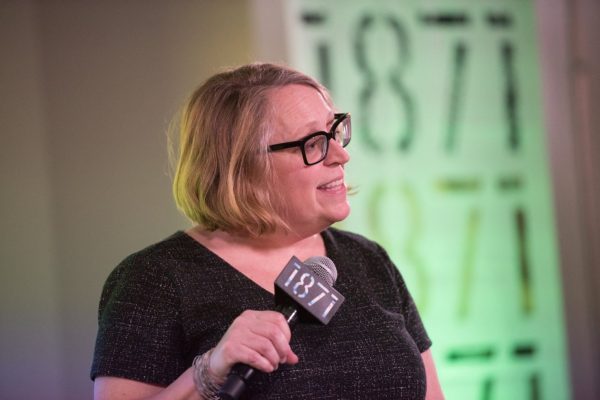Amy Rynell joined Active Trans as its new executive director in March. An experienced nonprofit leader with a deep commitment to social justice and human rights, Rynell comes to Active Trans having served in various research and policy roles at Chicago-based Heartland Alliance over the last 22 years, most recently serving as director of research and policy.
Amy shared her thoughts about what it’s been like to lead the organization through the COVID-19 crisis, how she plans to advance Active Trans’ mission, and how she uses sustainable transportation in her own life.
What attracted you to Active Trans?
Amy: Transportation access and safety can make or break someone’s ability to succeed economically. As someone who has worked on social justice issues my whole career, I believe we need to address the issues — like a lack of good transportation options — by analyzing their root causes. Tackling the major contributors to social problems will make our city and region a much better place for everyone to live.
How has Active Trans been responding to the global pandemic?
Amy: Importantly, we’ve been nimble and responsive with our efforts. This includes focusing on supporting policies and actions that ensure safe movement of essential workers. As we look at who those essential workers are and we overlay that information with who is most impacted by COVID-19 in our city, racial and economic inequities are evident.
This has helped ensure that people who need to take transit to get to work or to meet their basic needs have a safe way to do so — and that those transit operators who are also essential workers are able to keep safe while working.
How do you plan on using your extensive experience in social justice policy and research to advance the mission of Active Trans?
Amy: My strength lies in thinking big and moving big transformative efforts forward through our policy processes. Public policy is a long game. One of the things I appreciate about Active Transportation Alliance is that we are in it for the long haul. And I appreciate in many ways that the process around determining what we are fighting for and how we fight can be just as important as the change itself.
Our built environment and transportation ecosystems are very telling in terms of who has access to decision makers and power, and this is a century-long challenge in our city. The folks in our communities made most vulnerable by structural inequities haven’t had power in those conversations. We want to make sure that our work brings that to the forefront and brings the wisdom of the most impacted communities into the solutions in ways that our policy process hasn’t always been able to. It’s where the organization has been moving and it’s where I want to see the organization continue to get stronger.
What’s your vision for Active Trans and how it can really transform the sustainable transportation landscape in Chicago and the surrounding regions?
Amy: When it comes to livability and mobility across our region, we have a long way to go to making that a reality. There are still preventable deaths and injuries from transportation crashes that did not need to happen. Our region’s transportation systems are not seamless. They’re not convenient. They’re not affordable. And those are all the things good public transportation systems should be.
What are some of the specific projects that Active Trans is working on right now that you think are particularly important?
Amy: In the early days of COVID-19, one of the successful policy victories we achieved was enabling bike shops to stay open as an essential service. That’s been important in helping those businesses, but more importantly, it helps people keep rolling who need biking as an option.
Limiting damage to our public transit system is going to be a deep, long, intense haul in partnership with many others. Without transit, our community cohesion, quality of life, and safety plummet. We don’t want become a place where everybody only uses cars to get around. That does not create a healthy region or healthy people. A lot of work will be needed there.
We also had some important interim victories on biking and on transit with more ahead, including rear door boarding for buses, which is a much faster way to board. It’s a temporary solution that the CTA put in place in response to COVID-19, but it’s something we’ve been advocating for in recent years. I’d like to see how we can make that a more permanent part of that system, especially for busy routes.
On top of these, we are taking on bold solutions, so as shelter in place eases, everyone can safely enjoy sustainable travel options and ensure we don’t see a surge in driving.
How do you see safety as it relates to Active Trans’ work?
Amy: I know that safety is an important part of people’s calculus around their transportation decisions, and how that safety is defined and conceptualized is different for each person based on where they live. I’m attuned to that in this work — from just feeling safe traveling from one block to another, or feeling safe on a bike and sharing a road with a car, or feeling safe on public transit. It’s important to know how this plays out in people’s lives and know that there are many different experiences we need to take into account as we move forward with our work.
What does the first cancellation of Fifth Third Bike the Drive mean for Active Trans?
Amy: The cancellation has been difficult to be sure. Biking a car-free Lakeshore Drive surrounded by 20,000 other supporters is an extraordinary way to welcome summer. Importantly, it’s also a large part of our annual income. We’re actively raising funds to make up for the loss so that we can continue doing important work for the region. I would urge everyone who cares about better walking, biking, and transit to help ensure we continue making a difference. If you are able to give, please consider donating as part of Active Trans Giving Day on May 22.
How does walking, biking, and public transit fit into your life and the life of your family?
Amy: A key part of the decision to live in Oak Park was that we wanted to live in a place where we weren’t reliant on a car. We’re a multi modal family, walking to school, services, and transit, biking around town and to work, and squeezing in a few bike camping trips each summer. You meet so many different people and see the city and neighborhoods in different ways when you’re moving a little bit slower and spending less time in a car. I just love how active transportation enriches my life and my experience of people and places.

